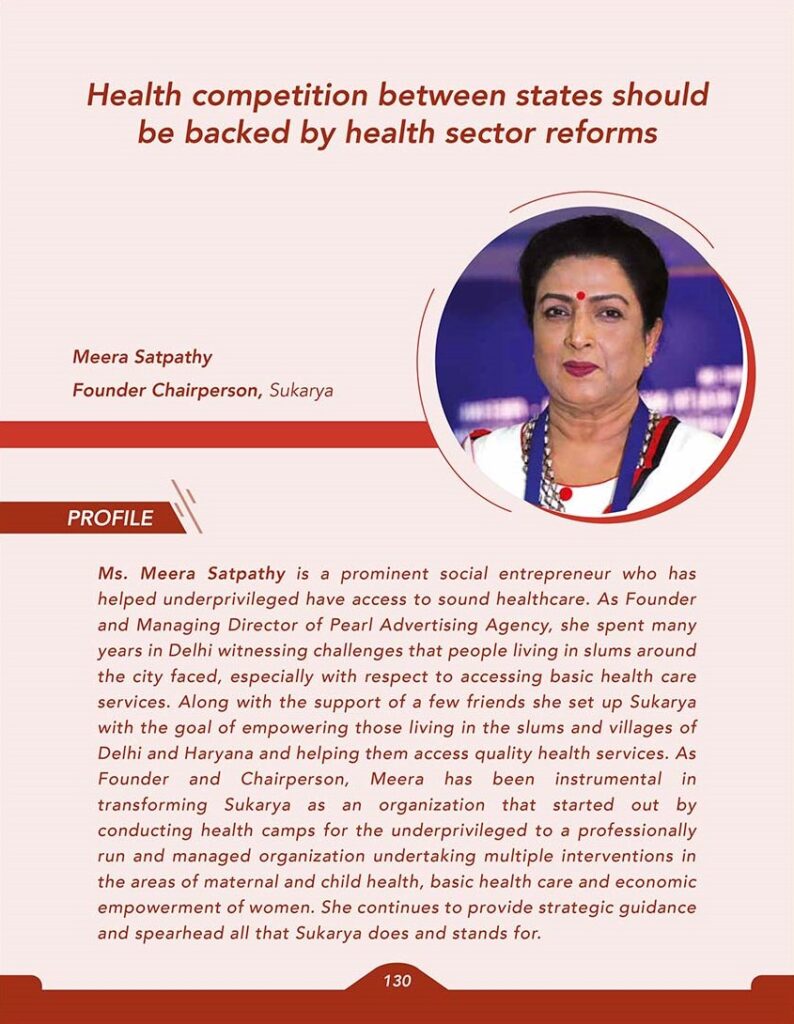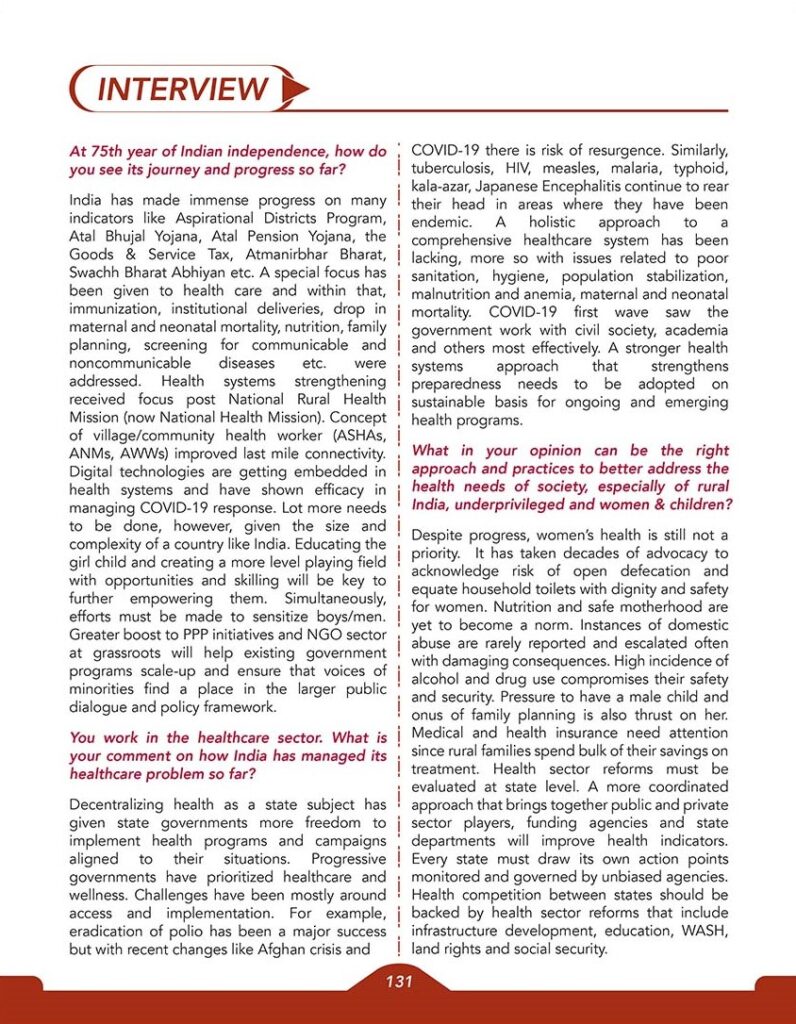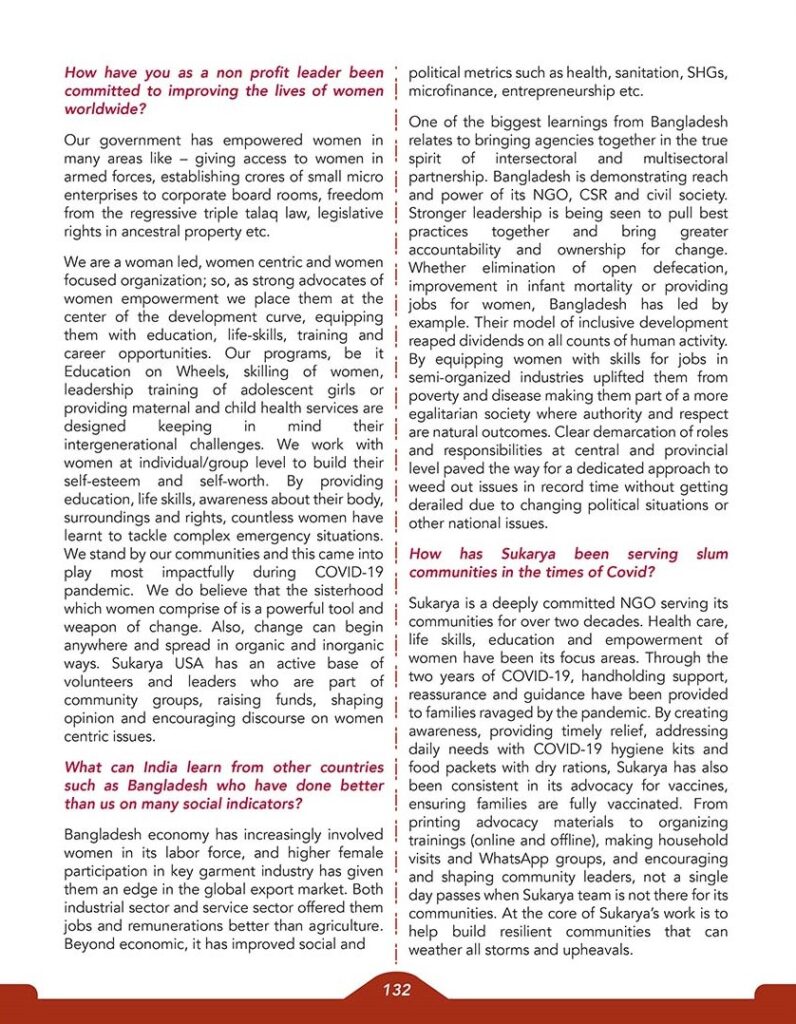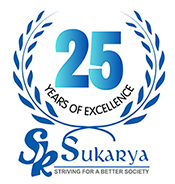by Meera Satpathy
After personally witnessing the immense difficulties faced by slum dwellers in and around Delhi to access basic health care, some friends and I decided to set up Sukarya, to try and help them. We began by organising health camps, and they were so successful that Sukarya today has become a household name in the slums of Delhi and Haryana as a professionally run outfit which organises multiple interventions in the areas of maternal and child health, basic health care and economic empowerment of women. As the organisation’s founder and chairperson, it gives me immense joy each time we are able to help someone, and at same time it makes me realise how much more needs to be done.
As we prepare to mark India’s 75th Independence Day, we should be proud of what we have achieved as a nation. Schemes like the Aspirational Districts Program, Atal Bhujal Yojana, Atal Pension Yojana, Goods & Service Tax, Atmanirbhar Bharat, Swachh Bharat Abhiyan have transformed our country. Healthcare, immunization, institutional deliveries, reducing maternal and neonatal mortality, nutrition, family planning, screening for communicable and noncommunicable diseases received special attention. Health systems were strengthened with the National Rural Health Mission (now National Health Mission) and the concept of village/community health workers (ASHAs, ANMs, AWWs) improved last mile connectivity. Embedding digital technologies in health systems proved highly effective in managing the COVID-19 pandemic. Decentralizing health has given state governments more freedom to implement programs and campaigns aligned to their specific needs.
This blog is from my conversation published in a compendium of articles in a special issue to mark India’s 75th year of independence. The title of this publication is Aspiring India @75 Azadi Ka Amrit Mahotsav, “ navigating in a an uncertain world” and here is the link to the write up in Financial Express,
CHALLENGES REMAIN
The main challenges revolve around access and implementation. For example, polio eradication has been a major success, but recent events like the Afghan refugee crisis and the COVID-19 pandemic could spark a resurgence. Similarly, tuberculosis, HIV, measles, malaria, typhoid, kala-azar, Japanese Encephalitis continue to rear their head in areas where they have been endemic.
Despite progress, women’s health is still not a priority. It took decades of advocacy to acknowledge the risk of open defecation and equate household toilets with dignity and safety for women. Nutrition and safe motherhood are yet to become a norm. Instances of domestic abuse, fuelled by the high incidence of alcohol and drug use, are rarely reported, and escalations often compromises their safety and security. The pressure to bear a male child remains a major issue. Medical and health insurance need attention since rural families spend most of their savings on treatment.
SOME SOLUTIONS
A more coordinated approach that brings together public and private sector players, funding agencies and state departments will improve health indicators. Each state must draw its own action points monitored and governed by unbiased agencies. This should be backed by health sector reforms that include infrastructure development, education, WASH, land rights and social security. Our government has empowered women in many areas like – giving access to women in armed forces, establishing crores of small micro enterprises to corporate board rooms, freedom from the regressive triple talaq law, legislative rights in ancestral property etc. The first wave of COVID-19 saw the government work with civil society, academia and other stakeholders most effectively. But again, a lot more needs to be done.
THE SUKARYA WAY
As woman-led, women-centric and women-focused organization, we place them at the centre of the development curve and equip them with education, life-skills, training and career opportunities. Our programs, like Education on Wheels, skilling of women, leadership training for adolescent girls, providing maternal and child health services, are designed keeping their intergenerational challenges in mind. We work with women both at an individual and group levels to build their self-esteem and self-worth. The sense of sisterhood we promote is a powerful tool and weapon of change, not just in India, but globally. Sukarya USA has an active base of volunteers and leaders who are part of community groups, raising funds, shaping opinion and encouraging discourse on women centric issues.
NEIGHBOURHOOD WATCH
We can learn a lot from Bangladesh. Encouraging women in the labour force, particularly in the garment industry, has given them an edge in the global export market. The industrial and service sectors offered them jobs which pay more than agriculture. This empowered them economically, and also improved social and political metrics such as health, sanitation, SHGs, microfinance, entrepreneurship etc. By bringing agencies together in the true spirit of intersectoral and multisectoral partnership, Bangladesh has demonstrated the reach and power of its NGO, CSR and civil society. Whether it is elimination of open defecation, improvement in infant mortality or providing jobs for women, Bangladesh has led by example. Equipping women with skills for jobs in semi-organized industries uplifted them from poverty and disease, making them part of a more egalitarian society. Clear demarcation of roles and responsibilities at central and provincial level ensured that these measures were not derailed due to changing political situations or other national issues.
REACHING OUT
Sukarya is a deeply committed NGO which has been focusing on healthcare, life skills, education and empowerment of women for two decades. For the past two years, we’ve supported, reassured, and guided families ravaged by the pandemic by creating awareness, providing COVID-19 hygiene kits and food packets with dry rations. We’ve also been advocating full vaccinations by organizing trainings (online and offline), making household visits and encouraging and shaping community leaders. Our core objective is to help build resilient communities that can weather all storms and upheavals. All this has been possible because of kind hearted citizens and responsible organizations. Thank you for helping us make the world a better place.



